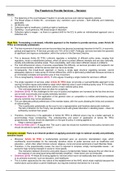The Freedom to Provide Services – Revision
Issues:
1. The balancing of the court between Freedom to provide services and national regulatory policies.
2. The Broad scope of Article 56 – encompass ‘any’ restriction upon services – both distinctly and indistinctly
applicable.
3. De-Minimis rule
4. Collective right to healthcare v individual right to healthcare
5. Gambling – court generous, MS broad scope of discretion
6. Collective rights to wages – so there is a general shift for the ECJ to prefer an individualised approach over a
collective one.
Rigid Rule: Formulating a rule-based, inflexible approach to the freedom to provide services, under Article 56
TFEU, is intrinsically problematic.
The free movement of services and service-providers has become increasingly important in the EU, in economic,
political and legal terms → Services provide over 70% of EU’s GDP. Politically, services has been the epicentre
of significant and vigorous contestation, within the context of the Services Directive.
• This is because Article 56 TFEU uniformly regulates a multiplicity of different policy areas, ranging from
regulatory, moral or redistributive policies, which all serve to protect different interests and are also nationally,
socially and politically sensitive areas. Thus unavoidably, each area raise’s different issues or problems.
• The multi-dimensional nature of services exacerbates this difficulty, as services providers and recipients can
move across borders, whilst the service itself can be cross-border.
• Consequently, this broad-brush approach or having a single legal structure regulating services, cannot
adequately capture or make sense of intrinsic differences, which is particularly problematic because services is
an intrinsically complete and sensitive area of free movement.
• This is recognised by Chalmers (2015) → who argues ‘Creating a single market for services is difficult’.
• The single regulation of services under Article 56 TFEU does not provide a nuanced/flexible approach to the
varying normative issues and problems raises which distinctly arise in each individual policy area → The Article
is insufficiently sensitive to the normative claims of each national policy area.
- This rule based approach does not allow for complexity.
• Chalmers (2015) → ‘the challenges for the court of justice and legislator are increased by the fact that services
can be both economically and socially extremely sensitive’.
• Hatzopoulos (2011) → “the application of the general rules on competition to entities administering social
security schemes may not be satisfactory.
• This can dislocate political preferences of the member states, with the courts dictating the limits and constrains
of national policy.
- This is particularly problematic as the court is not a representative and therefore democratic institution.
- The lack of direction for the Treaty, has provided courts with greater discretion in deciding cases – does not
sufficiently constrain their power.
• Therefore, incoherency in the application of Article 56 TFEU to different area’s may be a better approach to
accommodate these complexities. The understanding and extent of application of Article 56 TFEU
(proportionality review) should be dependent on the type of policy it is being applied to.
- Adopt a sectoral approach.
• Florris De-Witte (2017) → argues that ‘The court’s case law should be incoherent across policy domains and
should be tailored to specific policy area’s’.’
Economic concept: There is an inherent problem of applying economic logic to national socially and politically
sensitive issues
• Moreover, Article 56 TFEU is fundamentally premised upon an economic rationalisation logic, which
insufficiently accommodates for the nationally sensitive nature of public services such as healthcare and
education – which often reflect intrinsic cultural, religious, moral and social sentiments of each Member State.
• Therefore, in the proportionality review, the court is required to compare, simply incomparable issues – an
economic logic is being imposed on social or moral goods.
- This interaction between Economic and public issues is fundamentally flawed, because this can often be at
the expense of one area/issue being detrimentally simplified – these area’s are not irreducible.
• Chalmers (2015) → Article 56 is being applied to ‘services which have not traditionally been seen as tradeable
or as primarily economic’ such as education, and healthcare.
• This is further captured by the very nature of the establishment of the NHS, which exists explicitly because the
market alone cannot allow or permit healthcare, but requires external intervention for it to exist.
, • Moreover, labour would be insufficiently protected if there was no intervention in the market, labour law exists
by virtue of the market being unable to regulate such services.
- So therefore the very reason we have these rules/the logic of these policy area’s is because economics can
not make sense of them – so when the ECJ is forced to conceptualise services in terms of economics this
is inherently problematic/they are not logically linked so cannot or should not be directly compared.
• Problematic → Grogan (C-159/90) → the court applied the economic logic to abortion. Nonetheless, in light of
the sensitive nature of abortion, it is likely that the court’s reasoning was strongly influenced by policy
considerations.
• Chalmers (2015) → ‘moral, social and cultural perspectives are tested against economic rights, rather than
economic rights being clearly subordinated to higher norms’.
• Nonetheless, in Kohll (C-158/96) → ‘The court has held that the special nature of certain services does not
remove them from the ambit of the fundamental principle of freedom of movement’’ – no exceptions.
• Hervey (1998) → This is problematic because ‘the ability and indeed duty to apply EC Law hinders national
courts from explicitly approaching issues concerned with moral and ethical choices’.
The Scope of Article 56 TFEU is incredibly/extensively broad:
• Article 56 TFEU outlines that – ‘Restrictions on freedom to provide services within the Union shall be prohibited
in respect of nationals of Member States who are established in a Member State other than that of the person
for whom the service is provided’
• The scope of Article 56 is extensive – as the regulation encompasses all forms/types of mobility – the only
requirement is that the provider and the recipient of the service are within different MS’s.
• This has even been applied very broadly:
1. Vestergard (C-55/98) → the ECJ extended Article 56 beyond its literal wording. Although both the
provider and the recipient were in Denmark, and thus the transaction was domestic, the court held that
this was in the scope of the Article.
2. ITC (C-208/05) → this was taken further where the COJ held that Article 56 applied, irrespective of that
fact that the client, provider and payment all occurred within Germany.
Market Access:
• As demonstrated in Alpine Investments (C-384/93) → Article 56 TFEU has been judicially conceptualised as
an instrument in permitting market access of services, rather than merely serving a protectionist function,
whereby only distinctly applicable rules are disallowed.
- The indistinctly applicable Dutch rule, which prohibited cold-calling for certain services, fell within the scope
of Article 56 because ‘such a restriction deprives the operators concerned of a rapid and direct technique
for marketing and contracting potential clients in other Member States’.
- This is so broad to enable Article 56 become a tool for a general review of national legislative proportionality
by the ECJ.
• This extremely/incredibly broad scope is reaffirmed in Arblade (C-369/96) → in which the ECJ held that Article
56:
1. ‘requires not only the elimination of all discrimination on grounds of nationality against providers of
services who are established in another MS’
2. ‘but also the abolition of any restriction, even if it applies without distinction to national providers of services
and to those of other Member States, which is liable to prohibit, impede or render less advantageous the
activities of the provider of services established in another Member State’.
• As Chalmers (2015) remarks → this ‘suggests a broad scope to Article 56, in which comparison between the
domestic or foreign is irrelevant, the only question being whether some hindrance to service provision can be
argued’.
- There is no requirement for cross-border interaction here.
• The significant implications of this are powerfully as demonstrated in Ruffert (C-346/06) →
- In which the ECJ held that the imposition of the condition that the building contractors must be paid the
German ‘minimum wage’ may impose ‘on service providers established in another Member state where
minimum rates of pay are lower an additional economic burden that may prohibit, impede or render less
attractive the provision of their services’ and thus breaches Article 56 TFEU.
• Chalmers (2015) → argued that the reading of Article 56 TFEU was ‘undesirable and unrealistic, and an
unconvincing reading of the intention of Article 56’.
Limitations/Problems with this approach:
• This is similar to the ruling in Scotch Whisky, as the ECJ depoliticises an intrinsically politically and nationally
sensitive area – in this case, minimum wages – and enforces the notion of a competitive internal market, rather
than a socially-minded one.
- Distinctly applicable measures, indistinctly applicable measures, and measures which prevent access to the
market are all caught by the provision.





